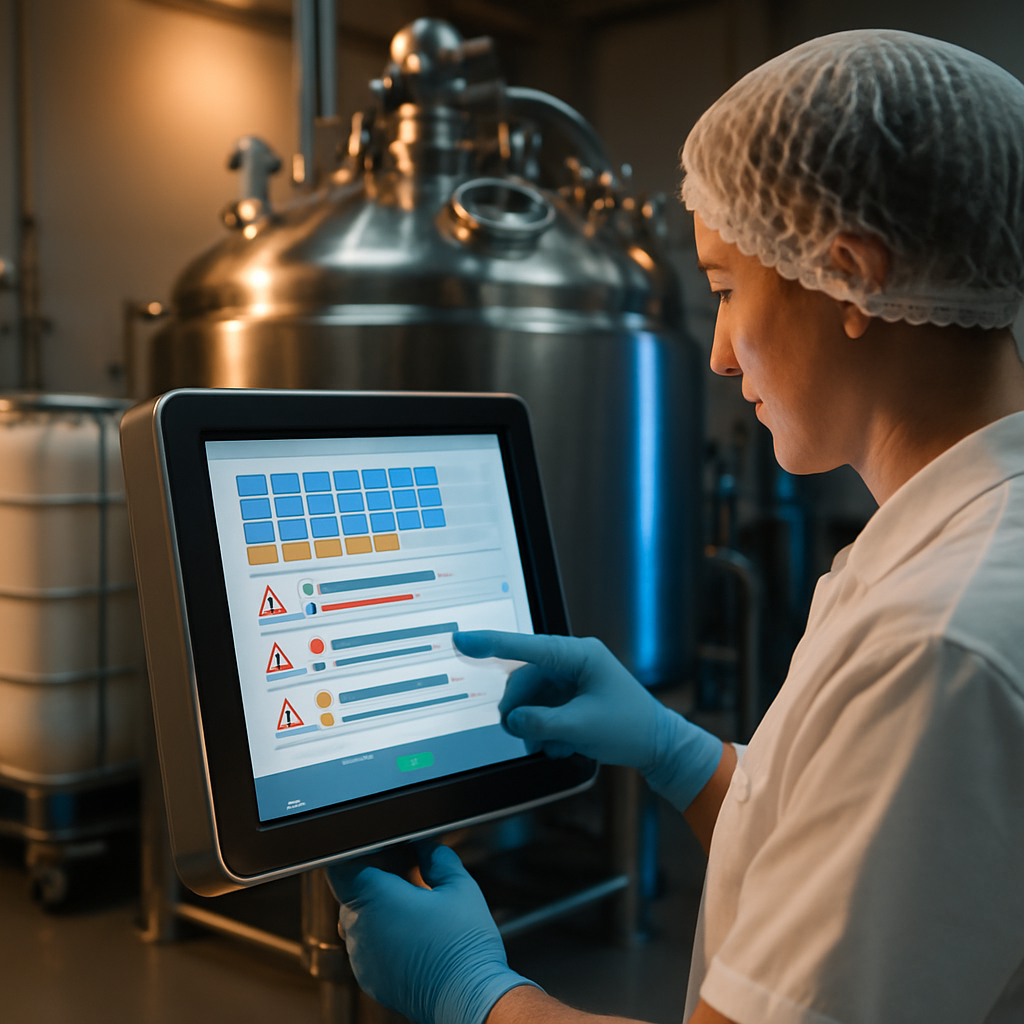Emerging ERP Market Trends in Manufacturing for 2026 and Beyond
Are you confident your ERP system can keep pace with what’s coming? Manufacturers are already rethinking what ERP should do, moving beyond...
6 min read
 Blake Snider
:
Nov 21, 2025 7:00:00 AM
Blake Snider
:
Nov 21, 2025 7:00:00 AM
The pet food industry is booming. Pet owners are spending record amounts and demanding human-grade quality and ingredient transparency for their animal companions, a trend confirmed by the American Pet Products Association (APPA). For pet food manufacturers, this growth is a massive opportunity, but it also introduces significant challenges. The regulatory landscape, governed by The FDA Food Safety Modernization Act (FSMA), imposes strict standards for safety and traceability.
Relying on basic accounting software, spreadsheets, and manual processes is no longer just inefficient; it's a direct risk to your business. A modern Enterprise Resource Planning (ERP) system designed for the food manufacturing industry is the key to scaling operations safely and profitably.
Many growing pet food manufacturers still run on a patchwork of spreadsheets and entry-level accounting software. This approach creates dangerous data silos and relies heavily on manual data entry, which is both time-consuming and prone to errors. In a regulated industry like pet food manufacturing, these errors can lead to disastrous consequences for your profitability and brand reputation.
When a supplier reports a contaminated ingredient, you must know exactly which finished product batches are affected and which customers received them. Trying to trace this manually through spreadsheets and shipping logs can take days. A recall that should be a precise, targeted action becomes a costly, brand-damaging event where you're forced to recall entire product lines.
Your recipes are your core intellectual property. Managing them in spreadsheets is a huge risk. A simple error in a cell formula can cascade, leading to incorrect vitamin premix calculations, nutritional imbalances, or massive cost overruns. Version control is nearly impossible, making it difficult to innovate or adjust formulations based on ingredient costs without breaking something.
Spreadsheets can't provide a real-time view of your inventory. This blindness means you risk using expired raw materials in a batch, violating FEFO (First-Expired, First-Out) protocols. You also can't accurately forecast reorder points, leading to production-stopping stockouts of a critical ingredient or, conversely, overstocking perishable items that end up as waste.
FSMA requires detailed, accessible records for everything from supplier certifications and ingredient receiving to sanitation schedules and quality assurance tests. Managing this documentation manually is an auditor's nightmare. A single missing log or an illegible signature can result in a compliance failure, fines, or a forced shutdown of your production line.
A unified ERP system is the central nervous system for your manufacturing operation. It demolishes data silos and creates a single source of truth, allowing your entire team—from the receiving dock to the finance department—to work from the same real-time data. This integrated software solution transforms your business processes from reactive to proactive.
This is the most critical benefit. A modern ERP system provides bi-directional (forward and backward) lot traceability. If a customer reports an issue, you can trace that finished good backward to every raw material lot used in its production in seconds. Conversely, if a supplier recalls an ingredient, you can trace it forward to see every finished batch and customer shipment, enabling mock recalls in minutes, not days.
An ERP system provides a framework for quality assurance, not just a place to store data. It can automatically place incoming raw materials on "QA Hold" until your lab clears them for use. It enforces digital checklists for sanitation and production line changeovers, creating a perfect, time-stamped audit trail that makes FDA inspections a simple reporting exercise.
Forget guesswork. An ERP system manages inventory based on specific attributes like lot number, expiration date, and even allergen status. It enforces FEFO picking in the warehouse, ensuring older stock is used first and dramatically reducing spoilage. This real-time visibility extends to supply chain planning, helping you make smarter purchasing decisions.
Your recipes are managed centrally within the ERP. When you schedule a production run for "Grain-Free Salmon & Pea" treats, the system automatically reserves the correct inventory. It scales the recipe, prints a detailed batch ticket for the production floor, and, as the job is completed, consumes the raw materials and adds the new finished goods to your inventory count instantly.
Once manufacturers recognize the need to upgrade, they face a key decision: invest in a small, niche "pet food software" or a robust, scalable ERP platform like IFS. While niche solutions seem appealingly specific, they often become a technical and financial dead end.
Many small, industry-specific software solutions are built on older technology or are missing critical business-wide modules. They might handle basic traceability but lack sophisticated financial reporting, advanced supply chain planning, or multi-site warehouse management. As your pet food business grows—adding new product lines, production facilities, or eCommerce channels—you will quickly hit the ceiling of what these systems can do.
A platform ERP like IFS provides the best of both worlds. It offers a powerful, modern, and fully integrated suite that includes world-class modules for finance, manufacturing, supply chain, and even asset management. This platform is then configured to meet the specific demands of food and beverage, including lot tracking, quality, and recipe management. You get deep industry functionality without sacrificing the scalability you'll need in five years. Its strength in handling complex production is why it's also a top choice for ERP for chemical manufacturing, which shares similar needs for batch control and compliance.
A mid-sized pet treat baker invested in a niche system. It worked well when they had one production line. When they expanded and launched a direct-to-consumer website, the system couldn't cope. It lacked an open API to connect to their eCommerce platform, forcing them to manually re-enter online orders into the system. This time-consuming, error-filled process created shipping delays and unhappy customers. A scalable ERP platform would have integrated these business systems seamlessly, supporting their growth instead of hindering it.
When you are evaluating ERP systems, look past the sales presentation and demand to see these specific features. These are the non-negotiable functions that separate a true manufacturing ERP from a simple accounting system with add-ons.
Do not settle for anything less. You must be able to demonstrate a full "one-step-forward, one-step-back" trace for any ingredient or finished product. Ask the vendor to show you how the system handles a mock recall, from a customer complaint back to the raw material supplier, and how long the report takes to generate.
The system must be able to manage complex recipes and formulations, not just simple bills of material. It should handle version control (e.g., "Recipe v1.1"), allow for scalable batches, and instantly calculate the nutritional and cost impact of substituting one ingredient for another. This is foundational to both quality and profitability.
Your QA module should not be a digital filing cabinet. It must be an active part of your workflow. The ERP system should be able to automatically trigger a "receiving inspection" task for the lab when a PO arrives. It should also prevent a production batch from being packaged or shipped until a QA "Pass" status is entered.
A modern ERP system helps you buy smarter. Using a combination of sales forecasts, current inventory levels, and production schedules, the system's Material Requirements Planning (MRP) engine will suggest exactly what you need to order and when. This prevents shortages and reduces the amount of cash tied up in excess raw materials.
The system needs to track allergens (e.g., grain, chicken, soy) as an attribute for every ingredient. This data must flow through the recipe to the finished good. This ensures accurate label generation and helps you manage production scheduling to prevent cross-contamination on the line, a key part of the digital evolution in pet wellness.
Moving to a new ERP is a significant business transformation, not just an IT project. As of late 2025, successful implementations focus on two key areas: cleaning your data and managing your people.
This is the most challenging and critical phase. You cannot simply "dump" your old spreadsheet data into a new, structured ERP. You must first go through a rigorous process of validating every recipe, confirming every bill of materials, and cleaning up your supplier and customer information. Garbage In, Garbage Out (GIGO) is the golden rule; starting with bad data will guarantee a failed implementation.
The goal of an ERP is to standardize your best practices. This requires training, but more importantly, it requires buy-in. Identify "process champions" in each department (warehouse, production, finance) early on. Train them first, let them help align the software's workflows with your shop floor realities, and then empower them to train their peers.
For most manufacturers, a "phased" go-live is safer than a "big bang" (where all modules go live on one day). A phased approach might involve launching the Finance and Inventory modules first, followed by Production and Quality Control. This minimizes disruption to your shipping schedule and allows your team to adapt to the new system in manageable stages. This is a common strategy when selecting from the top ERP systems for manufacturing.
The high-growth pet food industry offers incredible opportunities, but it also operates on high stakes. Your brand's reputation and your company's survival depend on your ability to prove the safety and quality of your products. Legacy systems and spreadsheets are a liability that your business can no longer afford.
A modern, scalable ERP system like IFS transforms compliance from a cost center into a competitive advantage. It gives you the end-to-end visibility and control you need to manage your inventory, streamline production, and guarantee traceability from supplier to customer.
If you're ready to see how a modern ERP handles the unique challenges of pet food manufacturing, Schedule an IFS ERP Demo with our team. To discuss your specific production, compliance, or inventory needs, contact us to speak with a specialist in pet nutrition ERP.

Are you confident your ERP system can keep pace with what’s coming? Manufacturers are already rethinking what ERP should do, moving beyond...

As of October 2025, the food and beverage industry operates on razor-thin margins under immense pressure from regulators and consumers. Food and...

For heavy equipment manufacturers, the wrong ERP software is a direct threat to project profitability. Your operation depends on managing complex,...